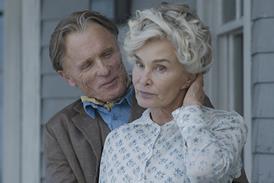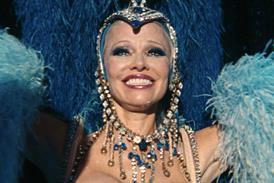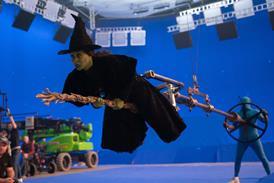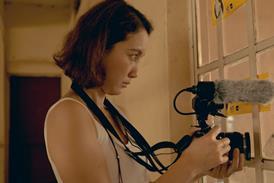Dir: Timur Bekmambetov. Russ. 2006. 135mins.
A solid piece of escapist entertainment, Day Watch, the sequel to Night Watch, again demonstrates howRussia is capable of making special effects-laden fare on a par with Hollywoodproductions.
While its main audienceis likely to be fans of the first film, returns at home especially will behelped by broader romantic and family elements which should draw a widerdemographic.
But those comingto the series for the first time will not be lost,thanks to a structure and exposition similar to Night Watch that makes DayWatch as much a remake as a straight sequel. The lesson learnt from beforeseems to be take a winning formula, then amplify it.
In Russia, Day Watch is expected to break localrecords following its release on 510 prints - the widest opening for a homegrownfilm there - from Jan 1, the start of the 10-day New Year-Christmas holiday (inRussia, Christmas fell on Jan 7). Already it has passed $20m with hope that itwill beat all-time box-office champion Company9 (which took $23.6m last year).
Beyond that, Day Watch should perform respectably inmarkets where Night Watch has playedwell. So far the first film - which was distributed by Fox outside the CIS - hastaken more than $32m internationally, with openings in the US, Japan andseveral Asian markets yet to come.
The story picksup where the previous film left off, as Anton Gorodetsky(Khabensky) continues to work for the Night Watch, asecret organisation of shape-shifting sorcerers whomake up the Forces Of Light. It masquerades as theMoscow electric company, ensuring that the Forces Of Darkness- a motley collection of witches, warlocks and vampires - do not breach anancient pact designed to keep the two sides perfectly balanced.
The new filmtakes it title from the body analogous to Night Watch that ensures the forcesof Light observe their part of the bargain.
Anton iswrongfully accused of breaking the pact through murder and hides from the DayWatch by magically trading bodieswith his female colleague Olga (Tyunina).
Parallel to thisis the clash between Anton's love interest Svetlana (Poroshina), a powerful young sorceress, and Yegor (Martynov), Anton'sestranged 12-year-old son, who has joined the Forces Of Darkness.
Anton'soverarching motivation is to bring Yegor back to theside of good with the aid of the Chalk of Fate, with which one can"rewrite" destiny (at one point the film was to be called Night Watch 2: The Chalk Of Fate).
Events eventuallyclimax in an explosive battle between the Forces Of Lightand Darkness, during which prominent Moscow landmarks such as the Ostankino TV tower and the KosmosHotel are destroyed.
Day Watch benefits from Timur Bekmambetov's tight direction, which despite the heavyplotting keeps the pace even and even manages to tie up several plot elementsoutstanding from the first film. It should also further raise his profilebeyond Russia, with a crossover to English-language fare - as happened with Guilermo Del Toro following Cronos - only a matter of time.
Thecast from before reprieve their roles. Konstantin Khabensky, arguably Russia's most internationally visibleactor of late, is one of those stars who is more of apersonality-for-hire than a chameleon. The older Vladimir Menshov- director of 1980 Foreign Language Oscar winner Moscow Does Not Believe In Tears - brings gravitas as Boris Gesser, head of the Night Watch.
But the mostinteresting performance comes from Galina Tyunina (seen in Alexei Uchitel'sHis Wife's Diary) who spends most ofthe time exploring her male side as she literally embodies Khabensky'scharacter. It's a challenge that she's up to, achieving a convincing suspensionof disbelief without any special effects other than sound editing for the voiceswitch.
Bothcinematography and CG work prove more ambitious than before: whilepost-production took place in Los Angeles, the budget is still a sub $5m,visually enhancing the feature's scope. The back story of the Chalk isintroduced through a spectacular opening sequence that involves Mongol-Turkconqueror Tamerlane battling mystical warriors in aPersian fortress, before melding with the present day.
Moscow itself ispresented with a continuity and conscious sense of place that grounds thenecessary sense of disbelief for the fantastical elements to work.
But the mostnovel and eerie element is when the characters enter the Sumrak,a bleak netherworld take on reality which the Forces OfDarkness access in order to navigate the real world unseen. This is rendered asan empty trash-strewn alleyway which in normal circumstances was a busymarketplace thronging with people.
Productioncompanies
Channel One Russia
Tabbak Film
Baselevs Production
Russia & CISdistribution
Gemini Film
Internationalsales
Channel One Russia
Producers
Anatoly Maximov
Konstantin Ernst
Screenplay
Timur Bekmambetov
Sergei Lukyanenko
Cinematography
Sergei Trofimov
Production design
Valery Viktorov
Editor
Dmitry Kiselyov
Music
Yuri Poteyenko
Main cast
Konstantin Khabensky
Maria Poroshina
Dmitry Martynov
Galina Tyunina
Vladimir Menshov
Viktor Verzhbitsky
Alexei Chadov
Zhanna Frisque





























No comments yet